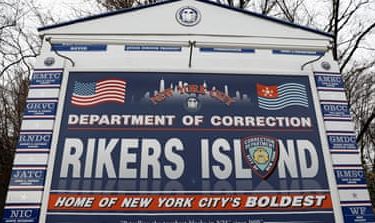Coronavirus prison cases raise alarms, calls for inmate release
First inmate to test positive at New York’s big Rikers Island has prompted calls for prison release where possible.

The confirmation of several coronavirus cases in the United States’s expansive prison system this week has drawn concern from health experts and families of inmates alike.
Rikers Island, a notoriously tough prison administered by the New York City Department of Corrections (NYC DOC), saw the first confirmed case of COVID-19, the disease caused by the new coronavirus, with an inmate on Wednesday. That followed prison workers with confirmed cases at Sing Sing and a facility in Albany, New York.
Keep reading
list of 3 itemsWhat happens if you catch the new coronavirus?
Coronavirus: Travel restrictions, border shutdowns by country
An employee of the federal Bureau of Prisons (BOP) at an administrative facility in Texas tested positive, along with another BOP employee in New Hampshire who may have had contact with inmates, according to local media
The cases signal a turning point in the US prison system, the conditions of which could foster the spread of the coronavirus.
“People who live in congregate settings, including detainees and prisoners, are at risk of acquiring this infection,” Dr Robert Greifinger, former chief medical officer of the New York State Department of Correctional Services, told Al Jazeera in an email.
Health measures
The US has the largest prison population in the world, with roughly two million people behind bars on any given day, and the highest per-capita incarceration rate. Prisons and jails across the country are overcrowded and often face less-than-ideal sanitary conditions.
Health officials across the world have stated that elderly people and those with chronic conditions are the most vulnerable to the virus, which has infected at least 310,000 people and killed more than 13,000 as of March 22, according to the Johns Hopkins University tally.
The majority of inmates in US prisons are aged between 31 and 50, according to statistics from the US BOP. Still, about 20 percent are aged between 51 and 65 and over.
The Centers for Disease Control and Prevention (CDC) has recommended a 10-person limit on social gatherings and encouraged “social distancing”, the limitation of physical contact such as handshakes and the adherence to a minimum six-foot (1.8m) distance between people in public.
For prisons, this is exceedingly difficult. Rikers Island is 1.67 square kilometres (0.64 square miles) with a daily average of 10,000 inmates but a maximum capacity of 15,000. Space is limited.
Many inmates at maximum-security units like Rikers or Sing Sing, which is operated by the New York State Department of Corrections and Community Supervision (DOCCS), remain alone inside their cells for 22 to 23 hours a day.
While this may sound like a quarantine of sorts, inmates rely on prison staff to provide medical care, food and sanitation. Then there are required security checks.
“Needless to say, staff share the same risk” as inmates, “and staff are most likely to bring infection into correctional facilities, inadvertently,” Greifinger said.
Next steps
Prisons are designed to limit interaction with the outside world, even without a pandemic. Prison systems nationwide have cancelled visitations, unless with necessary resources like lawyers, and prison phone operators offering short-term free phone calls.
Al Jazeera reached out to family members of inmates with underlying conditions, who asked not to be named, to ask if they had received information about prison health practices regarding the virus.
Some said no, while others said they had followed the websites of the agencies that administered the prisons in which their family members were housed.
Al Jazeera contacted prison departments in New York City, New York State and Texas to enquire about their efforts to contain the spread and disseminate information to family members of inmates.
TDCJ Director of Communications Jeremy Desel told Al Jazeera there are “no cases of COVID-19 connected to any of our facilities” and that further information can be found on their website.
NYC DOC did not respond to requests for comment.
|
|
DOCCS forwarded Al Jazeera information that said it had successfully managed outbreaks of tuberculosis, HIV/AIDS, and hepatitis c in the past. The bureau also has a comprehensive Pandemic Flu protocol that has been adjusted to deal with the coronavirus.
Still, there have been calls to release prisoners in order to mitigate the crisis from prison advocate groups and politicians alike.
New York City Mayor Bill de Blasio told a local radio station on Wednesday that in “the next 48 hours, we will identify any inmates who need to be brought out because of either their own health conditions – if they have any pre-existing conditions, etc – or because the charges were minor and we think it’s appropriate to bring them out in this context.”
To Greifinger, this is a step in the right direction. “The most vulnerable people in congregate settings are at high risk of death,” he said.
“To the extent possible, government agencies should reduce the risk of death by releasing detained persons in the near future,” Greifinger concluded.